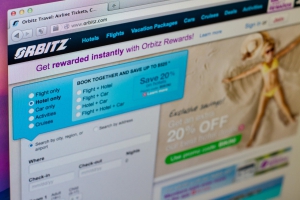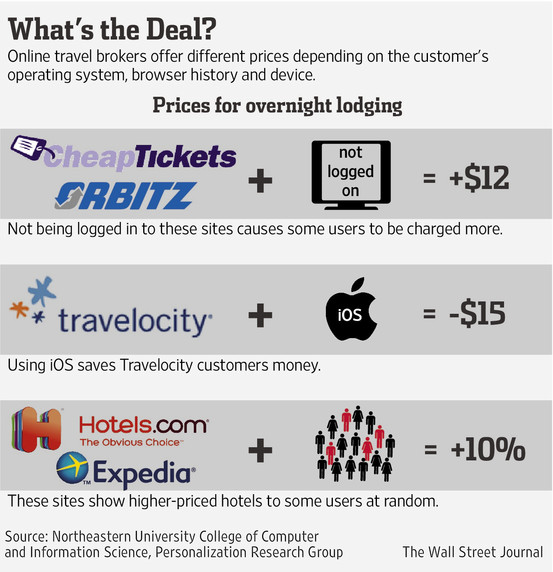 We live in an instant gratification society, so it’s not unheard of that people prefer to conduct their lives with the ease of a click. From banking, to shopping to booking travel, consumers may think they’re saving time and money, when really they may be doing anything but.
We live in an instant gratification society, so it’s not unheard of that people prefer to conduct their lives with the ease of a click. From banking, to shopping to booking travel, consumers may think they’re saving time and money, when really they may be doing anything but.
So, with all the information online marketers are able to gather about their customers, are online companies using this plethora of data to their advantage (and to their customers disadvantage)?
A study by computer scientists at Northeastern University found that price steering price steering (also known as price discrimination), which is when companies extend behind-the scene personalization to prices to charge different amounts for the same product, is much more ingrained in online travel booking that we could have imagined, The Wall Street Journal reported.
Out of 16 top e-commerce sites, the study found that six used pricing discrimination and did not alert the consumer of the differences in prices.
Two popular travel sites were guilty of price steering. Cheaptickets and Orbitz charged users an average of $12 more per night on hotel rates if they weren’t logged onto the site, while Travelocity charged mobile Apple users an average of $15 less than others. The study also found that Hotels.com and Expedia steered random users to pricier products.
Factors such as prior browsing, purchase history, the location of the store and whether or not the customer is using a mobile phone could influence what a customer sees on the company’s site.
Vice President of corporate affairs at Orbitz Worldwide Inc. Chris Chiames told The Wall Street Journal that the company clearly states its loyalty program and other deals.
“The Northeastern study states that ‘overall, most of the experiments do not reveal evidence of steering or discrimination,’ and so we are curious as to why a handful of exceptions to searches on thousands of hotels is the basis of this paper’s conclusions, or even worthy of a story,” Chiames told The Wall Street Journal in an email. “Would you be as interested in a Kmart ‘blue light special’ deal that was made available to shoppers who happen to be in a certain store at a certain time?”
But, the company didn’t advertise that users could receive discounts for simply logging in. On both Orbitz and Cheaptickets, which is also owned by Orbitz Worldwide, registered users were shown a tab labeled “members only” that offered lower prices.
This isn’t the first time price discrimination has been identified. It’s basically been on the surge since online shopping became the norm, and in 2012, a Wall Street Journal investigation found that Orbitz was charging Mac users up to 30 percent more than PC users. However, the recent study by Northeatern University has found that this discrimination is no longer taking place.
Expedia and Hotels.com, which both hail from Expedia Inc., don’t practice price steering but rather use a marketing strategy called A/B testing, The companies continuously refines the pricing methods by randomly placing shoppers in a group that highlights either more or less pricey hotels. The customer has no idea which group they’ve been placed in and may or may not fall victim to higher rates.
Looks like there are, in fact, still instances when talking to a live person is beneficial–just watch out for those over-the-phone booking fees airlines often charge these days.
Clients of Cook Travel-Ovation can rest assured that they’ll be spared the frustration of fare anomalies and complicated procedures that most online agencies and booking engines provide.
Algorithms act on mathematical impulse, agents act on the individual and unique needs of their clients.
Don’t book with an algorithm, book with a live agent.

 Save up to 60% on Business Class. Call 1-800-435-8776
Save up to 60% on Business Class. Call 1-800-435-8776


Leave A Comment